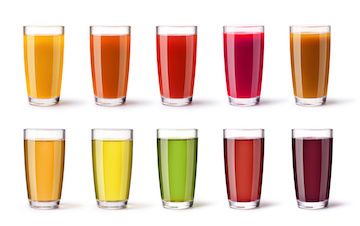New APP Guidelines: No Fruit Juice Before 1 Year
New American Academy of Pediatrics (AAP) guidelines warn against giving fruit juice to children under the age of one. Recent evidence suggests that fruit juice has little nutritional benefit, causes dental erosion and contributes to obesity. Children should get nutrients through whole fruit instead to eliminate exposure to the excess sugar and negative effects of fruit juice.

The American Academy of Pediatrics has said that researchs shows fruit juice is too high in sugar to give to children under the age of one.
The American Academy of Pediatrics (AAP) has recently revised guidelines advising against giving fruit juice to children before one year of age. In the past, it was thought that fruit juice was a good source of vitamin C and extra water for healthy infants and toddlers. The new recommendation is based on substantial scientific evidence that suggests fruit juice does more harm than good in the first year of a child’s life.
RELATED: More Dental Industry News
· Study Suggests Dental Lab Techs Have Increased Mesothelioma Risk
· New Study Suggests Dentin can be Strengthened by Grape Seed Extract
· Cybersecurity Spending to Increase to $65 Billion in Next 5 Years
It’s true that some fruit juices are naturally high in certain vitamins and minerals, but a wealth of scientific evidence has shown that such juices are also high in sugar and low in other important nutrients, like fiber. A 2016 study showed fruit juices have as much as two teaspoons of sugar per each 100-milliliter serving. Another study determined that fruit juice and soda are the “biggest culprits of dental erosion.” Research has also indicated that fruit juice intake could be a contributing factor in childhood obesity.
Because of the overwhelming evidence against its consumption by young children, the AAP has determined "fruit juice offers no nutritional benefits for infants younger than one year," and shouldn’t be given to young children "unless clinically indicated." AAP fellow Melvin Heyman, M.D., said, “Parents may perceive fruit juice as healthy, but it is not a good substitute for fresh fruit and just packs in more sugar and calories. Small amounts in moderation are fine for older kids, but are absolutely unnecessary for children under one.”
The AAP further recommends that children between the ages of one and three should not consume more than four ounces of fruit juice daily. Juice should also not be given to toddlers in “sippy cups” which allow them to drink freely throughout the day. These types of bottles may cause teeth to be excessively exposed to fruit juice and lead to tooth decay.
The AAP says parents should encourage young children to eat whole fruits instead of drinking fruit juice. AAP fellow Steven Abrams, M.D., says, “We know that excessive fruit juice can lead to excessive weight gain and tooth decay. Pediatricians have a lot of information to share with families on how to provide the proper balance of fresh fruit within their child's diet." Dentists are also in prime position to educate parents on the evidence against fruit juice consumption in very young children.